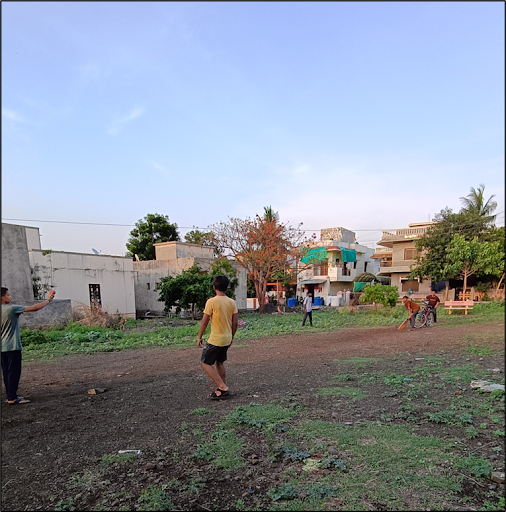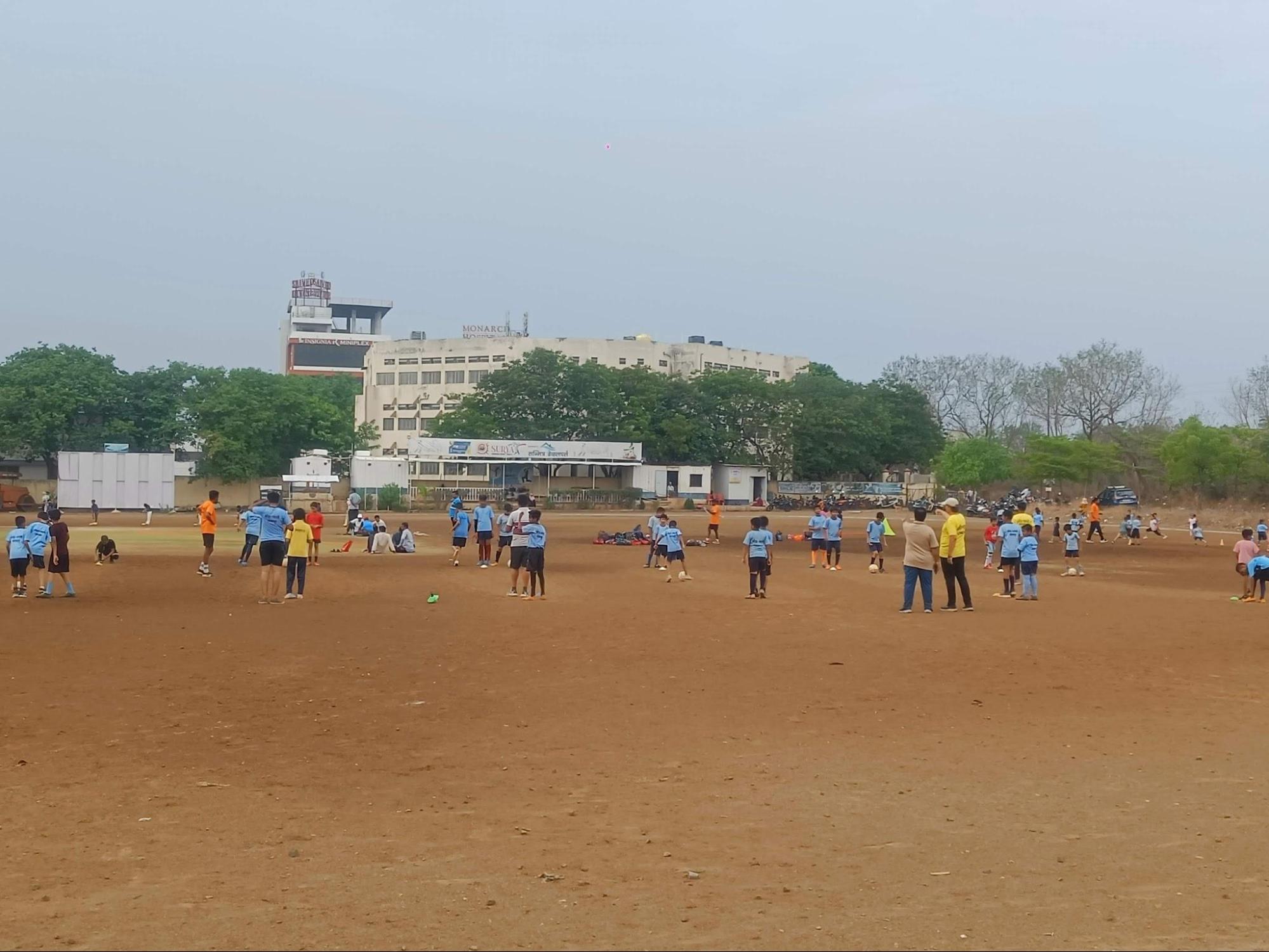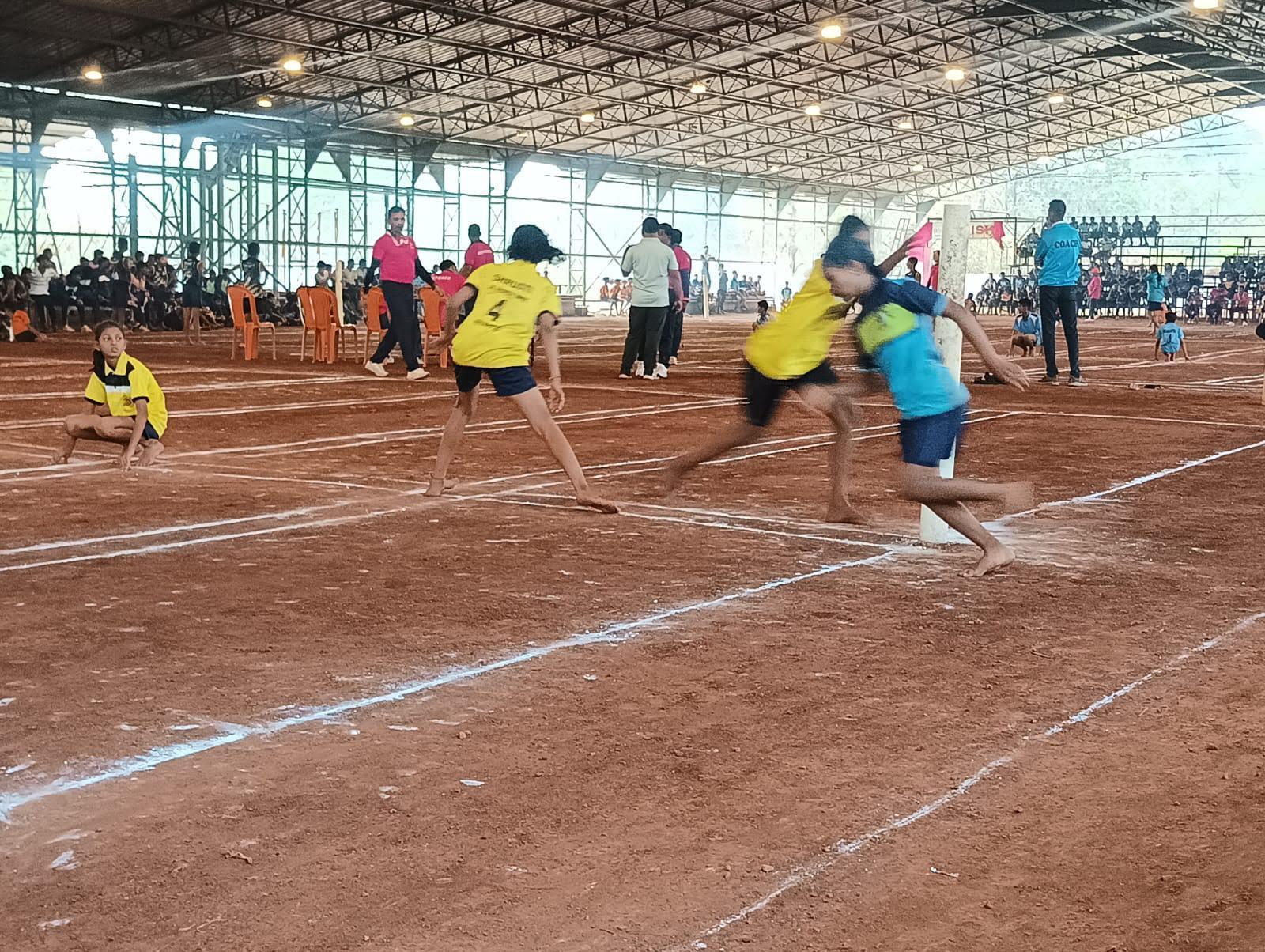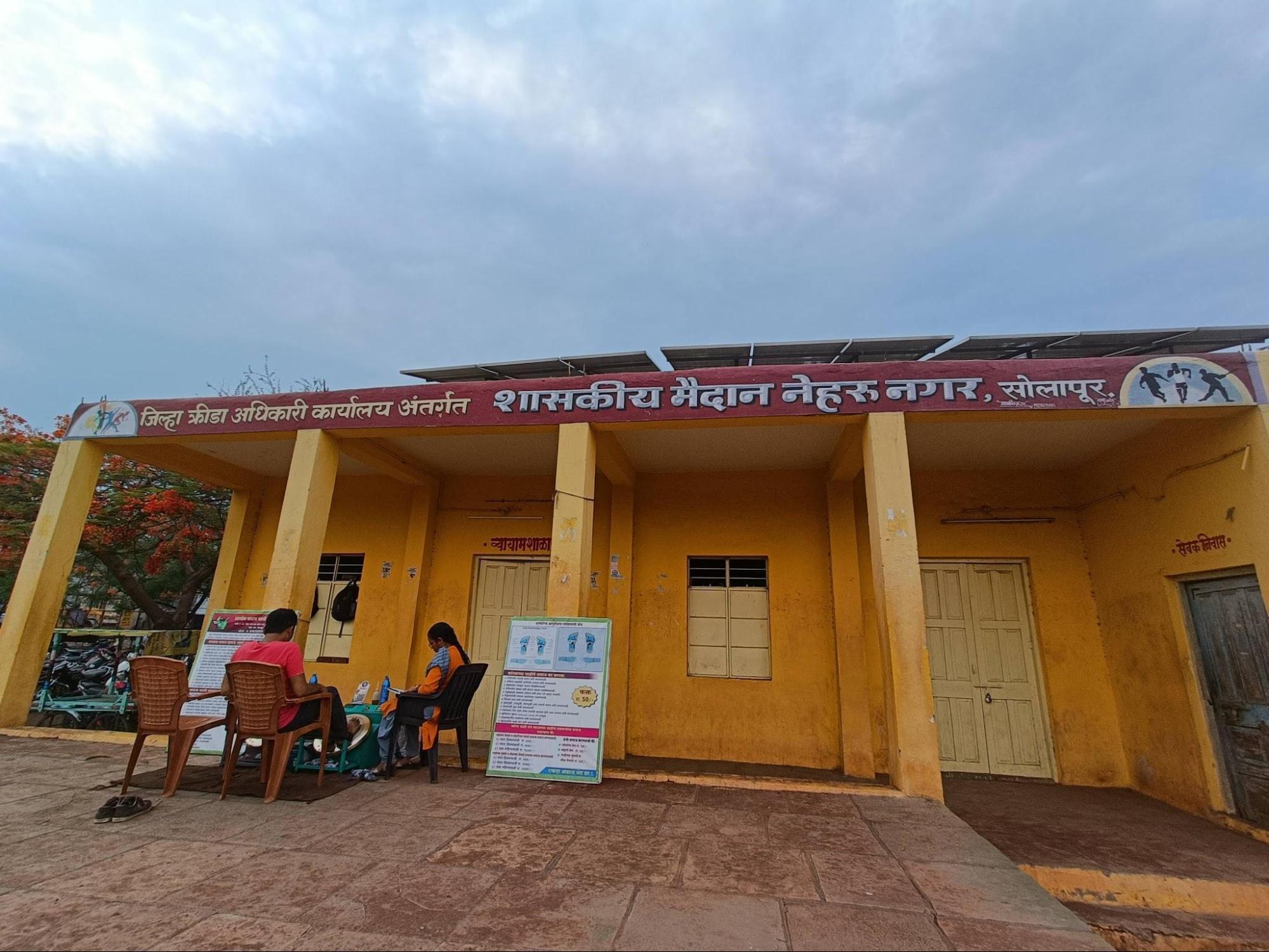Contents
- Traditional Games
- Bail-Gada Shariyat (Bullock Cart Race)
- Tyre Rolling Races
- Chowka Bara
- Adik Midik Kida
- Coconut, Coconut, Yes Sir
- Hadga
- Competitive Sports
- Cricket
- Football
- Kho Kho
- Sport Personalities
- Ramji Kashyap
- Kedar Jadhav
- Anagha Deshpande
- Vinit Indulkar
- Suyash Jadhav
- Kiran Prabhu Navgire
- Prarthana Gulabrao Thombare
- Sports Infrastructure
- District Sports Complex and Ground
- Gold's Gym
- Slim Health Club
- Talims
- Sources
SOLAPUR
Sports & Games
Last updated on 22 July 2025. Help us improve the information on this page by clicking on suggest edits or writing to us.
Traditional Games
Solapur lies adjacent to districts such as Sangli and Satara, which are quite famous for their Kusti (Wrestling) and Mallakhamb akhadas and players. Though the Akhada and Talim culture has somewhat been forgotten, important talims such as the Krushna Talim, Patra Talim, Panives Talim, Lashkar Talim, Khadda Talim, and Papaya Talim are still functioning and provide the necessary infrastructure needed for the training of various sports.
Bail-Gada Shariyat (Bullock Cart Race)
Bail-gada shariyat, or bullock cart races, were once a common tradition across rural Maharashtra, including Nanded district. The races were banned in 2011, but in 2017, the State government enacted a legislation to restart the races. However, the Bombay High Court stayed the legislation, and the Supreme Court initially declined to lift the stay, referring the matter to a larger bench. In 2021, the Supreme Court upheld the State’s legislation, thereby legalizing the races once more.
Similar games are played in Tamil Nadu, where it is known as ‘Jallikattu', also known as 'eruthazhuvuthal', and is played as part of the Pongal harvest festival. The Bail Gada shariyats of Maharashtra resemble the 'Kambala' race, held in Karnataka between November and March, which involves a pair of buffaloes tied to a plow and anchored by one person. They are made to run in parallel muddy tracks in a competition in which the fastest team wins.
The sport is extremely popular in this region of Maharashtra, and farmers with their bulls enthusiastically participate in it.
Tyre Rolling Races
Tyre rolling races are a delightful and simple game, often enjoyed by children in rural areas. All that is required is an old tire and a clear path, making it an easily accessible and fun activity. Kids use sticks or their hands to roll the tire, sometimes turning it into an exciting competition.
To get started, find old tires that are similar in size and weight, usually taken from cars or trucks. Next, choose a safe, flat path with no obstacles—a straight or gently curved route works best for a fair race. Mark a starting line where all participants will begin. Depending on the number of tires available, kids can race individually or in groups.
At the starting line, each player stands their tire upright, ready to roll. When the race begins, they push their tires forward using their hands or a stick to get them moving. The challenge lies in guiding the tire along the path, which may include straight stretches, gentle curves, or even small bumps to make the race more interesting.
The objective is simple: roll the tire from the starting line to the finish line as quickly as possible. In some variations, players must roll their tires back to the starting line after reaching the end. Along the way, it’s important to stay on the path and avoid interfering with other racers’ tires.
The race concludes at the marked finish line, where the first person to cross wins. Tyre rolling races are not only a fun way to compete but also a great activity for coordination, balance, and lively outdoor play.
Chowka Bara
Chowka Bara is a traditional household game commonly played using kawadi (shells) or tamarind seeds. Often, players break the tamarind seeds into two parts for use. In some cases, groundnut shells or small conch shells found in the sand are also used as substitutes.
The game board is usually drawn on the floor or a wooden peeta (stool) using chalk or rangoli powder. The game requires four kawadi as the primary dice. A minimum of two and a maximum of four players can participate in this game. Everyday items like four identical grains, stones, or matchsticks are often used as tokens to move along the board with ease. It is especially popular among women in villages and towns.
Adik Midik Kida
This game, popular in the past, required four to five players and was a favorite among children. The chosen player initiated the game by chanting, "Adik midik kida," to which the others responded, "Kiska ghoda." The chosen player then continued with, "Sangu ka nako," and the others replied, "Sang nahi tar bais."
Once the exchange was complete, the chosen player would challenge the players to touch specific objects. However, the twist was that the players could only cover the distance by touching items made of iron. If a player failed to stay in contact with an iron object and the chosen player managed to tag them, they were out of the game.
This game was a unique blend of creativity, agility, and resourcefulness, requiring players to cleverly navigate their environment. Once widely enjoyed by kids, it has now largely faded into obscurity and is rarely seen today.
Coconut, Coconut, Yes Sir
This game, widely played in villages and towns, involves a player standing in a small circle holding a stick while facing away from the other players. The game begins with the player shouting, "Coconut, coconut," and the others responding, "Yes sir, yes sir."
Without looking back, the player then tosses the stick behind them. If one of the other players catches the stick, the thrower is immediately out of the game. However, if no one catches it, the other players assign a specific number of steps for the thrower to cover the distance between the circle and the stick.
The challenge lies in covering the distance using only the exact number of steps allowed. If the thrower fails to reach the stick within the assigned steps, they are out of the game. This simple yet engaging game was a favorite among children in the past, blending elements of strategy, precision, and fun, though it is now rarely seen in modern times.
Hadga
Hadga is a traditional game where women form a circle around a mud elephant and perform rounds of chants while moving around it. This game is played in certain schools of Solapur during the festive season to pray for more rainfall.
Competitive Sports
Cricket
Cricket remains widely popular as the most popular sport in the district. Various local cricket tournaments are also held in the district at various places. Notably, Kedar Jadhav, a famous Indian cricketer, has his roots in Jadhavwadi in Madha. Cricket is also flourishing on the grounds near Solapur University and the renowned Haribhai Deokaran Cricket Stadium. Teenagers and children play the sport regularly on school grounds, parks, and other such places. The district’s cricket team, the Solapur Fighters, competes in the Maharashtra Cricket League (MCL) and has a respectable track record.

Football
Football is another sport that has risen in popularity in the district in recent years. The district also has the Solapur City and District Football Association, which is recognized by AIFF. Notably, two players from the district also made it to the Maharashtra State Senior men’s team for the 78th National Football Championship (Santosh Trophy) 2024-25. The district also participates in various state-level tournaments that are arranged by the WIFA.

Kho Kho

Kho Kho is yet another sport that is played in the Solapur district. There are various examples of how this game has changed the lives of various individuals who belong to poor rural communities. For instance, Janhvi Pethe from Khandobachi Wadi, a small hamlet in Solapur, participated in the 2019 National Juniors and won the player of the tournament award, and Ashwini Shinde from the same hamlet was selected to the Indian National Women’s Kho-Kho team and participated in the 2025 Kho-Kho World Cup, New Delhi. India won the World Cup in both the Men’s and Women’s categories.
Sport Personalities
Ramji Kashyap
Ramji Kashyap, originally from a village in Uttar Pradesh, is an accomplished Kho-Kho player who represented India at the 2025 Kho-Kho World Cup. His family migrated to Velapur village in Solapur during the 1990s in search of work and better economic opportunities. His father began working as a Bhangarwala (scrap collector), collecting and reselling scrap, with Ramji and his siblings helping in the work.
Velapur, being the last major stop before Pandharpur for Varkaris, has large open grounds traditionally used for resting and gathering. It was on these very grounds that Ramji developed his love for Kho-Kho, a game commonly played in the area by locals as part of the region’s tradition.
Before his selection to the Indian team, Ramji also played in the Ultimate Kho Kho league for the Chennai team. He was named ‘Player of the Tournament’ twice in a row and is recognized as one of the top attackers and defenders in the entire league.
Kedar Jadhav
Although born in Pune, Kedar Jadhav’s family originally hails from the village of Jadhavwadi in Madha, Solapur. Born on 26 March 1985, Jadhav is a former cricketer who began his cricketing journey at the PYC Hindu Gymkhana in Pune. He first played for Rainbow Cricket Club in tennis ball tournaments before being selected for the Maharashtra under-19 team in 2004.
Jadhav represented Maharashtra in domestic cricket and was known as a right-handed batter who occasionally kept wickets and bowled right-arm off-spin. In the Indian Premier League (IPL), he played for several teams, including Chennai Super Kings, Sunrisers Hyderabad, Delhi Daredevils, and Kochi Tuskers Kerala. He was also part of India’s squad for the 2019 Cricket World Cup. On 3 June 2024, he announced his retirement from all forms of cricket.
Anagha Deshpande
Anagha Deshpande, born on 19 November 1985 in Solapur, is a cricketer who has played in 20 women's One Day Internationals and seven Twenty20 internationals for India. She played for India Blue Women, India Under-21s Women, and the Indian Women’s Cricket teams. In June 2020, she was appointed as coach by the Uttarakhand Cricket Association (UCA) of Uttarakhand women's U-16 and U-19 teams.
Vinit Indulkar
Vinit Ajit Indulkar, born on 26 August 1984 in Solapur, is an Indian former cricketer. He played for the Mumbai cricket team and Himachal Pradesh in 40 Ranji Trophy matches.
Suyash Jadhav
Suyash Jadhav is a para-swimmer from the Karmala taluka of Solapur, though he has mostly trained and practiced at the Deccan Gymkhana in Pune. He is a gold and a double bronze medalist at the Asian Para Games. He has won two gold medals at the World Games and three silver medals at the German Swimming Championships. Jadhav has also won one gold, one silver, and two bronze medals at the Winter Open Polish Championships.
Kiran Prabhu Navgire
Kiran Prabhu Navgire, born on 18 September 1994 in Solapur, is a cricketer who currently plays for both the Indian national team and the Nagaland state team. She began her domestic career with Maharashtra in the 2018–19 Senior Women’s One-Day League but later moved to play for Nagaland as a guest player in the 2021–22 Women’s Senior T20 Trophy due to limited opportunities in the Maharashtra team. In 2022, she set a record for the highest individual score in the Women’s Senior T20 Trophy, scoring an unbeaten 162 for Nagaland against Arunachal Pradesh.
Prarthana Gulabrao Thombare
Prarthana Gulabrao Thombare was born on 18 June 1994 in Barshi city, Solapur district. She is an Indian tennis player primarily participating in doubles. She was once India's top-ranked player in women's doubles and has competed in the Olympics. Thombare has achieved success on the ITF Circuit, winning three singles and 27 doubles titles. Her highest singles ranking was No. 335 in the world, reached on 25 August 2014. In doubles, she peaked at No. 125 in the WTA rankings on 16 October 2017. Representing India in the Fed Cup, Thombare has a record of 17 wins and 10 losses as of April 2024. One of her notable achievements includes winning a bronze medal in women's doubles at the Asian Games and partnering with Sania Mirza.
Sports Infrastructure
District Sports Complex and Ground
The District Sports Complex, which is attached to the ground, provides a variety of sports facilities and recreational activities for the people of Solapur, especially in the Nehru Nagar area where the sports complex is situated. The ground is used for various sports, but specifically for Cricket, Jogging, and casual exercising. There is also a culture of morning walks, meditation, and yoga at the indoor stadium in Nehru Ground.

Gold's Gym
Founded in 2002, Gold's Gym in Solapur has earned a stellar reputation for its state-of-the-art equipment and top-tier facilities. As part of the world's largest co-ed gym chain, it adheres to internationally recognized fitness education standards and continually updates its training programs to align with global trends.
What sets Gold's Gym apart is its team of certified trainers, who provide personalized counseling tailored to individual needs. They take a comprehensive approach to fitness, focusing not just on physical exercise but on improving the overall health and well-being of their members. Highly regarded in fitness circles, the gym continues to be a premier choice for fitness enthusiasts in Solapur.
Slim Health Club
Established in 2008, the Slim Health Club has become a favorite among athletes, fitness enthusiasts, and beginners alike. It offers a variety of workout routines tailored to different fitness levels, ensuring that everyone from novices to seasoned athletes feels catered to.
The fitness instructors place a strong emphasis on improving posture, promoting healthy lifestyles, and guiding members toward balanced dietary habits. With its supportive and energetic environment, the gym motivates members to start and stay committed to their fitness journey, making it a welcoming space for all.
Talims
Solapur is renowned for its numerous talims (training centers), which hold a significant place in the region's sports and cultural heritage. Some of the most famous talims include Hiramani Talim, Boramani Talim, Khetrigalli Talim, Bujrak Ali Talim, Nhanuman Talim, Jummapheth Talim, Mahal Talim, Begampeth Moti Talim, Begampeth Dhakati Talim, Pachhapeth Talim, Taiungi Pachhapeth Talim, Roshanshah Talim, Madras Talim, Ekarbhali Talim, Ganeshpeth Talim, Sathe Talim, Ghisadi Talim, Hajimai Talim, Mangalvedhe Talim, Swami Talim, Kali Masjid Talim, Modi Talim, Sadar Bazaar Talim, Bender Talim, and several others.
Unlike akhadas, talims are more numerous in Solapur, reflecting the city's rich tradition of nurturing wrestling and physical fitness. These talims have played a pivotal role in producing skilled athletes and fostering community involvement in sports.
Sources
D. Mahapatra. 2021. SC permits bullock cart races to restart in Maharashtra. TOI.https://timesofindia.indiatimes.com/city/mum…
Jigar Hindocha. 2019. Rising from hamlets, these kho kho Maha champs dream big. Hindustan Times.
PTI. 2023. Supreme Court verdict on bullock-cart races | Maharashtra Ministers call it victory of farmers, promise all assistance for such events. The Hindu.https://www.thehindu.com/news/national/other…
Punekar News Team. 2024. Shivalkar named head coach of state Sr. squad. Punekar News.
R. Kumbhar. 2025. Ashwini Shinde from Khandoabachiwadi village selected for women’s kho kho world cup team. Sakal.https://www.esakal.com/paschim-maharashtra/s…
Shivani Naik. 2025. Kho Kho Kho: A 22-year-old’s journey from collecting scrap to stacking medals. Indian Express.https://indianexpress.com/article/sports/spo…
Wikipedia Contributors. Anagha Deshpande. Wikipedia.https://en.wikipedia.org/wiki/Anagha_Deshpan…
Wikipedia Contributors. Kedar Jadhav. Wikipedia.https://en.wikipedia.org/wiki/Kedar_Jadhav
Wikipedia Contributors. Kiran Navgire. Wikipedia.https://en.wikipedia.org/wiki/Kiran_Navgire
Wikipedia Contributors. Suyash Jadhav. Wikipedia.https://en.wikipedia.org/wiki/Suyash_Jadhav#…
Wikipedia Contributors. Vinit Indulkar. Wikipedia.https://en.wikipedia.org/wiki/Vinit_Indulkar
Last updated on 22 July 2025. Help us improve the information on this page by clicking on suggest edits or writing to us.